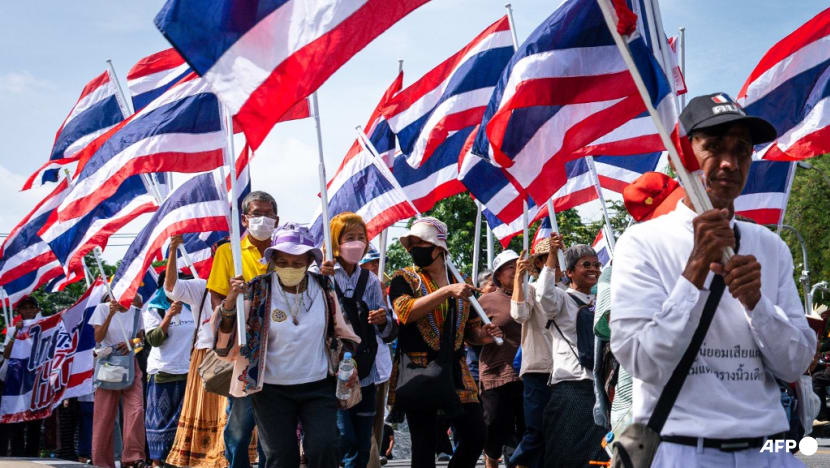Commentary: Thailand-Cambodia border row was escalating. The leaked call made it worse
Cambodia and Thailand fail to rise above nationalist narratives, says former foreign correspondent Nirmal Ghosh.

Thai protesters wave national flags during a rally against the government's handling of a border dispute with Cambodia in Bangkok on Jun 10, 2025. (Photo: AFP/Chanakarn Laosarakham)

This audio is generated by an AI tool.
SINGAPORE: In a rare breach of diplomatic norms, Cambodia’s former leader Hun Sen on Wednesday (Jun 18) released a recording of a private phone call with Thailand’s Prime Minister Paetongtarn Shinawatra on social media, escalating political tensions surrounding a long-running border dispute.
In the 17-minute audio, Ms Paetongtarn refers to Mr Hun Sen as “uncle” and urges him to ignore the Thai general overseeing the army in the border area whom she described as being on “the opposite side”. The remark has fuelled speculation about her relationship with the military, a politically sensitive issue given the army’s role in ousting members of her family from power – her father Thaksin in 2006 and his sister Yingluck in 2014.
Ms Paetongtarn has since apologised and defended her remarks as a “technical attempt to calm the country”, insisting there is no conflict with the Thai military.
Further muddying the waters is the personal history between the two political families. Mr Thaksin and Mr Hun Sen - who is now president of Cambodia’s Senate and the father of Cambodia’s current Prime Minister Hun Manet - are long-time friends.
That neither moved to defuse the situation has prompted speculation about domestic issues in both countries.
PERSONAL TIES, POLITICAL STRAIN
The two countries appear to have been taking their relations for granted, says Dr Pavin Chachavalpongpun of Kyoto University’s Centre for Southeast Asian Studies.
“During good times, leaders would be willing to put aside history, but when a regime becomes vulnerable or encounters domestic challenges, sometimes it is easy and convenient and even legitimate to bring back the wounds of history to divert domestic attention,” Dr Pavin told me.
Thailand and Cambodia share an 820km land border, parts of which are still not demarcated, and parts of which include ancient temples that both sides have contested for decades.
On May 28, a Cambodian soldier was killed in an exchange of gunfire between both nations’ troops at a disputed spot between Cambodia's Preah Vihear province and Thailand's Ubon Ratchathani province, reigniting tensions.
The incident triggered the most serious crisis between Cambodia and Thailand in years, with both sides making bristling statements and beefing up troops while scrambling to convene a two-day meeting of their Joint Boundary Commission (JBC) in Phnom Penh – which ended with no conclusion on Jun 15.
For Ms Paetongtarn, the crisis is an early test of leadership. Installed last year through a fragile coalition, she inherited both the Shinawatra name and its baggage. Her statement following the JBC - that Thailand “will not tolerate maltreatment, accusations or threats from any party” - was widely seen as an effort to project firmness. But the leaked phone call and the perception that she had undermined her own army’s authority has complicated that stance.
She is now facing mounting calls to resign. The conservative Bhumjaithai Party, the second largest in the alliance, pulled out of the coalition on Jun 18, saying Ms Paetongtarn had "damaged the sovereignty and well-being of the country and Thai Army".
GRIP OF SHARED HISTORY
No one expects a dramatic escalation. “Neither country can afford a war,” former Thai foreign minister Kasit Piromya told me.
But no one expects easy or speedy resolution either, as the issues involved are complex and complicated by domestic nationalism.
In fact, like the famed stone ruins of Angkor’s Ta Prohm held in place by the tentacles of giant strangler figs, Thailand and Cambodia seem unable to decisively shake off the grip of the perceived wounds of their ironically shared history.
Both countries have their own narratives to suit their mutual sense of victimhood and injustice - Cambodia through memories of the glory of its Angkor period lost to colonisation and encroachment by neighbours, and Thailand through a nostalgic view of its own imperial past, particularly the Ayutthaya era.
Border disputes are particularly difficult to resolve to both parties’ satisfaction because they often represent the legacy of historical conditions that no longer exist, a former Thai ambassador told me.
Each side has its own popular narrative formed over decades or centuries, which can metastasize with each retelling until it becomes part of the national identity, spawning chauvinistic memes that later generations with no direct memory of the grievances may nevertheless accept on faith, he said.
Any agreements on the border would mean both countries would need to give up some territory, and that would be difficult for their governments to sell to their public.
The best one can hope for is that pragmatism wins over emotions. Politics should be removed from efforts to resolve border disputes, governments and opinion leaders should refrain from stoking the flames of nationalism, and quiet diplomacy allowed to take its course.
All this is, of course, easier said than done.
“For all the cooperation frameworks in the region, Thailand and some of its neighbours are still in the trust-building phase,” said the former Thai ambassador who spoke with me on condition of anonymity. “Our proximity means we have a long history together. It also means we need to set aside our feuds and grudges if we are to have a future together.”
Nirmal Ghosh, a former foreign correspondent, is an author and independent writer based in Singapore. He writes a monthly column for CNA, published every third Friday.


















